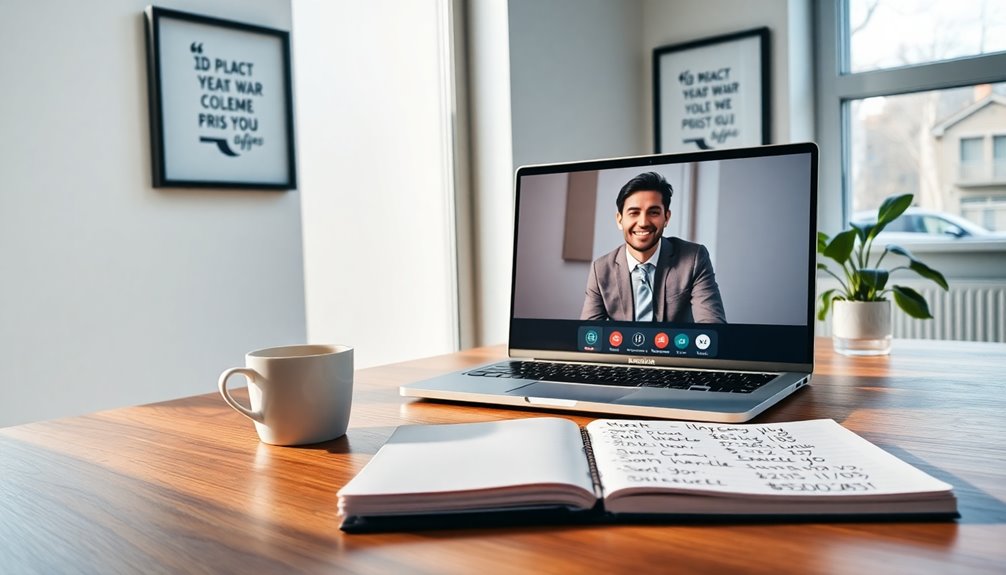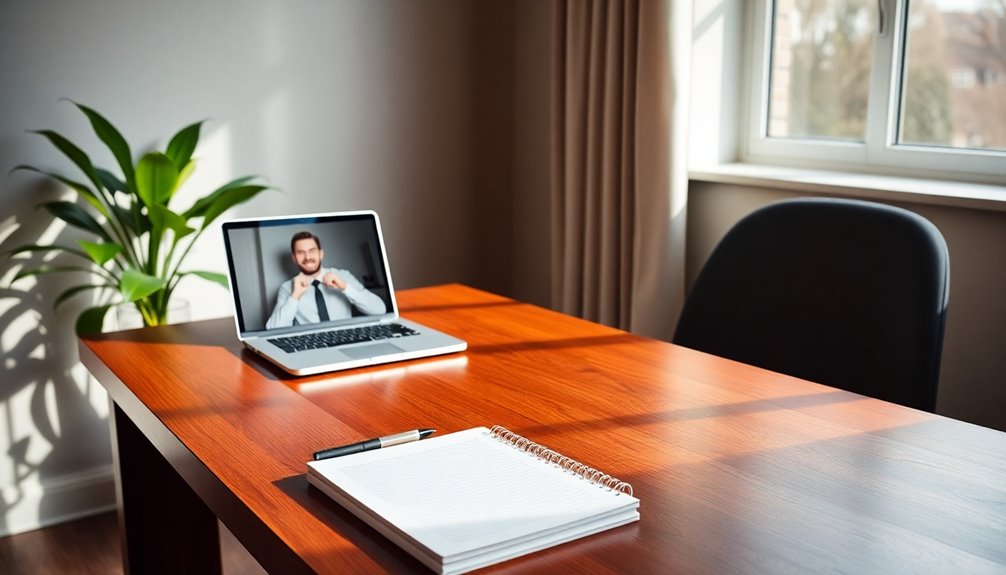To crush your Zoom interview, focus on clear communication and preparation. Understand what the recruiter values and be ready to discuss challenges, strengths, and motivations using the SAR method for impactful answers. Create a distraction-free environment, test your tech, and dress professionally to convey confidence. Maintain good posture and eye contact to stay engaged. Follow up with a thank-you email within 24 hours, referencing specific points from your discussion to leave a lasting impression. With these tips, you're well on your way to making a great impact; there's even more insight you'll want to explore.
Key Takeaways
- Test your audio and video settings before the interview to ensure a smooth experience without technical issues.
- Dress professionally to convey confidence and respect for the interview process.
- Prepare concise responses using the SAR method to clearly highlight your achievements.
- Create a distraction-free environment to maintain focus and demonstrate professionalism.
- Follow up with a thank-you email within 24 hours to reinforce your interest and appreciation.
Understanding Recruiter Goals

When it comes to steering your Zoom interview, understanding the recruiter's goals can give you a significant edge.
Recruiters often sift through numerous applicants quickly, aiming to identify the best candidates for hiring managers. Your awareness of their need for speed and efficiency can help you tailor your responses. They typically focus on verifying basic information, so be prepared to present your qualifications clearly.
Take notes on what the recruiter emphasizes during your conversation to align your responses with their priorities. Remember, initial calls are usually brief, so staying concise and relevant is essential.
Common Interview Questions

Anticipating common interview questions can greatly enhance your preparation and confidence. By knowing what to expect, you can craft tailored responses that showcase your strengths and experiences.
Here are some typical questions you might face:
- "Tell me about a time you overcame a challenge."
- "What are your greatest strengths and weaknesses?"
- "Why do you want to work here?"
Prepare structured answers that highlight key achievements and reflect your personality.
Practice the Situation, Action, Result (SAR) method to guarantee your responses are clear and impactful.
Professionalism and Communication

Professionalism and effective communication are essential during a Zoom interview, as they set the tone for how you're perceived by the recruiter. You should practice clear and concise responses, ensuring you articulate your thoughts without filler words.
Active listening is key; engage with the interviewer by nodding and paraphrasing to show understanding. Maintain a confident posture and make eye contact with the camera to create a connection.
Remember to keep your responses relevant and focused, respecting the recruiter's time. Your demeanor should reflect professionalism throughout the call, from your attire to your speech.
Preparing for the Interview

Preparing for a Zoom interview requires a strategic approach to guarantee you make a strong impression. First, utilize your home court advantage by having your notes accessible, affirming you're well-prepared.
Outline key points about the job description, and prepare personal pitches for common questions to sound confident and authentic.
- Imagine the relief of nailing that first impression!
- Picture yourself answering questions seamlessly and feeling in control!
- Envision the excitement of landing your dream job!
Also, affirm a distraction-free environment and test your audio and video settings beforehand.
This preparation not only boosts your confidence but also shows the interviewer your commitment to the opportunity. Moreover, demonstrating strong communication skills enhances clarity and can significantly influence the interviewer's perception of your leadership potential.
Knowledge of the Company

Understanding the company you're interviewing with is essential for making a positive impression. Research the company's mission, values, and recent news to show you're genuinely interested. Familiarize yourself with their products or services; this knowledge can help you tailor your responses during the interview.
Prepare a few key points about the company that resonate with your skills and experiences. When discussing the company, keep your responses concise and focused, demonstrating that you've done your homework. This not only highlights your enthusiasm but also engages the recruiter, inviting them to share more insights about the organization.
Your understanding of the company can set you apart from other candidates and show your commitment to the role. Additionally, having a solid grasp of financial terms can help you communicate more effectively during discussions related to the company's financial health.
Discussing Employment History

Discussing your employment history is an essential part of the interview process, as it gives you the chance to showcase your career journey and relevant experiences. Be prepared to highlight your key achievements, responsibilities, and what you learned along the way.
Focus on the impact you've made in previous roles to create a lasting impression.
- You want to convey your passion for your field and the value you bring.
- Sharing challenges you've overcome can demonstrate resilience and adaptability.
- Reflecting on your growth can evoke a sense of pride and confidence.
Keep your responses concise and relevant, ensuring you align your history with the job at hand. This approach will help you connect more effectively with your interviewer.
Salary Expectations

As you wrap up your employment history, the topic of salary expectations often comes up next. It's essential to approach this conversation with preparation.
Research the market rates for the position you're applying for, and come up with a salary range that reflects your skills and experience. When asked, don't hesitate to share your range but also feel free to deflect by asking, "What have you budgeted for this role?" This shows you're open to negotiation.
Interview Environment

Creating the right interview environment can greatly influence your performance during a Zoom interview. A well-prepared space helps you feel confident and focused.
Designate a specific area in your home for interviews, ensuring it's distraction-free and tidy. Good lighting is essential for visibility, so position yourself in a well-lit spot. Remember, your background should be professional and uncluttered.
- You want to impress the recruiter, not distract them.
- A calm environment minimizes anxiety and helps you think clearly.
- Feeling comfortable can enhance your communication and engagement.
Body Language Tips

A well-set interview environment lays the groundwork for your performance, but body language plays a pivotal role in conveying your confidence and engagement during a Zoom interview.
Sit up straight to exude confidence and keep an open posture. Use hand gestures to emphasize your points, but don't overdo it; you want to appear natural.
Maintain eye contact by looking at the camera, not the screen, creating a connection with your interviewer. Smile genuinely to foster a positive atmosphere.
Finally, confirm your understanding by paraphrasing questions or asking for clarification. These simple body language tips can greatly enhance your presence and leave a lasting impression during your Zoom interview.
Follow-Up Strategies

Effective follow-up strategies can greatly enhance your chances of landing the job after a Zoom interview. Sending a thank-you email within 24 hours shows your appreciation and reinforces your interest in the position.
In your message, reference specific points discussed during the interview to create a personal touch. Don't hesitate to follow up again if you haven't heard back in a week or two; it demonstrates your enthusiasm.
- You want to stand out in a sea of applicants.
- Every detail counts when it comes to making a lasting impression.
- A thoughtful follow-up could be the key to your dream job.
Employ these strategies, and you'll leave a memorable impact on your potential employer.
Frequently Asked Questions
How Should I Handle Technical Issues During the Interview?
When technical issues arise during your interview, stay calm and composed.
If you lose connection or encounter audio problems, quickly reconnect or switch devices if possible. Inform the interviewer about the issue if it persists, and be prepared to reschedule if necessary.
Have backup options ready, like a phone number to call in. Your poise can showcase your adaptability, which is a valuable trait in any role.
What Should I Do if I Forget an Answer?
If you forget an answer during the interview, stay calm and take a moment to gather your thoughts.
You can say, "I need a moment to think about that." It's better to pause than to rush an answer.
If it still doesn't come to you, pivot by discussing a related experience or skill instead.
Can I Use Notes During the Zoom Interview?
Imagine you're in a high-stakes game show, and your notes are your lifeline! Yes, you can use notes during a Zoom interview, but keep them discreet.
Jot down key points to glance at when needed, ensuring you stay engaged. Just don't read verbatim; that'll make you sound robotic.
Maintain eye contact and sound natural. Your notes should support you, not overshadow your personality.
Show them you're prepared, confident, and ready to shine!
How Do I Follow up After the Interview?
After your interview, it's important to follow up promptly.
Send a thank-you email within 24 hours, expressing gratitude for the opportunity and reiterating your interest in the role. Mention specific points from the conversation to personalize your message.
If you haven't heard back within a week or so, it's perfectly okay to send a polite follow-up email to inquire about the status of your application.
Keep it concise and professional.
What Should I Wear for a Virtual Interview?
For a virtual interview, dress as if you're meeting in person. Choose professional attire that reflects the company's culture.
A smart shirt or blouse paired with neat bottoms works well; you never know if you'll need to stand up. Avoid busy patterns and bright colors that might distract.
Make sure your hair is tidy and your background is clean. This shows respect and helps create a positive impression with your interviewer.
Conclusion
By following these tips, you're not just preparing for an interview; you're opening the door to new opportunities. Picture yourself confidently steering the conversation, impressing the recruiter with your professionalism and enthusiasm. Remember, every detail matters, from your environment to your body language. So, take a deep breath, smile, and let your passion shine through. This could be the moment that changes your career trajectory—don't let it slip away! You've got this!
Eugene brings a fresh, dynamic voice to our platform as one of our talented Writers. Specializing in research-driven content, he explores the latest findings in psychology and personal growth, translating them into actionable insights for our readers. Eugene’s work is fueled by a curiosity about what makes us tick and a desire to help others unlock their potential.










